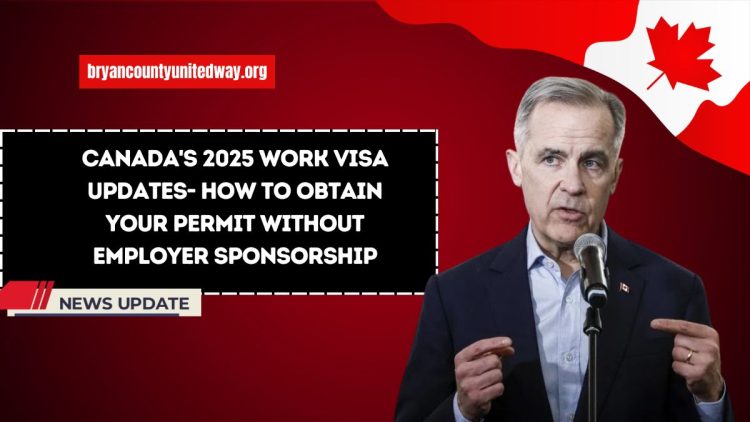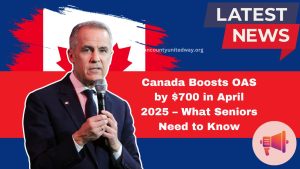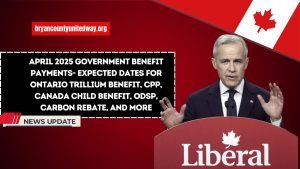Canada is unveiling a range of new work permit regulations for 2025, aimed at providing greater flexibility for individuals interested in working without the need for employer sponsorship. These updates are especially advantageous for those who do not have a job offer yet still wish to explore work opportunities within the country.
With the introduction of programs such as Open Work Permits, Self-Employed Visas, and Provincial Nominee Programs (PNPs), it has become easier for individuals to work independently in Canada.
This guide will walk you through the newly introduced rules, eligibility criteria, and the process for applying for a work permit in Canada without needing an employer’s involvement.
Understanding Open Work Permits (OWP)
What is an Open Work Permit?
An Open Work Permit (OWP) offers significant flexibility, allowing individuals to work for any employer across Canada without requiring a confirmed job offer or a Labor Market Impact Assessment (LMIA).
This permit is ideal for individuals such as freelancers, spouses of international students, and those in high-demand professions.
Eligibility for Open Work Permits
The following categories are eligible to apply for an OWP:
- Spouses of International Students: These individuals must be married to someone enrolled in master’s, doctoral, or professional programs like law or medicine.
- Spouses of Temporary Foreign Workers (TFWs): Eligible applicants must be employed in high-demand jobs (TEER 0, 1, 2, or 3 categories).
- Foreign Workers with Provincial Support: Applicants from provinces like Alberta, Manitoba, and Yukon can apply with the support of a provincial nomination.
Key Updates to OWP Rules (2025)
In 2025, the eligibility criteria for OWPs have been modified:
- Spouses of undergraduate students are no longer eligible.
- Provinces such as Alberta, Manitoba, and Yukon offer extended opportunities for applicants.
| Eligibility Criteria | Who Can Apply |
|---|---|
| Spouses of International Students | Enrolled in master’s, doctoral, or professional degree programs |
| Spouses of Temporary Foreign Workers | Employed in high-demand jobs (TEER 0, 1, 2, 3 categories) |
| Foreign Workers with Provincial Support | Applicants with support letters from provinces like Alberta, Manitoba, Yukon |
Pathways to Work in Canada Without Employer Sponsorship
Post-Graduation Work Permit (PGWP)
The Post-Graduation Work Permit (PGWP) allows international students who have graduated from a designated learning institution (DLI) in Canada to work unrestricted by employer involvement.
The PGWP is valid for up to three years, depending on the length of the study program. Graduates of a two-year program, for instance, would receive a three-year PGWP, providing an excellent opportunity to work and later apply for permanent residency through the Canadian Experience Class (CEC).
Self-Employed Work Permit
Self-employed individuals, such as freelancers, artists, entrepreneurs, and IT professionals, may apply for a Self-Employed Work Permit.
To qualify, applicants need to demonstrate how their work will contribute to Canada’s economy or culture. For example, a photographer with international recognition or a tech entrepreneur seeking to establish a business in Canada could apply for this permit.
Provincial Nominee Programs (PNPs)
Through Provincial Nominee Programs (PNPs), certain provinces allow individuals to apply for a temporary work permit prior to gaining permanent residency.
For example, Alberta’s Tech Pathway allows skilled workers, like software engineers, to work while awaiting approval for permanent residency. In 2025, applicants with valid work permits and provincial support letters can apply for PNP-specific work permits.
International Experience Canada (IEC)
The International Experience Canada (IEC) Working Holiday Visa is available for young professionals (ages 18-35) from select countries, offering the opportunity to work in Canada for up to two years without employer sponsorship.
For instance, an Australian aged 28 could live and work in Canada for two years under this program.
How to Apply for a Canada Work Permit Without Employer Sponsorship
The process for applying for a Canada work permit without employer sponsorship is straightforward but requires specific steps:
| Step | Action |
|---|---|
| Step 1: Determine Eligibility | Identify which program suits your situation (OWP, PGWP, Self-Employed, or PNP) |
| Step 2: Gather Documents | Collect passport, educational credentials, proof of funds, and work experience (if applicable) |
| Step 3: Apply Online | Submit your application through the IRCC Portal |
| Step 4: Biometrics & Medical Exam | Provide biometrics and undergo a medical exam (if required) |
| Step 5: Wait for Processing | Wait for the decision, typically within 8-12 weeks, depending on the program |
The changes to Canada’s work permit regulations in 2025 open up a wealth of opportunities for individuals who want to work in Canada without the need for employer sponsorship.
Whether through Open Work Permits, Self-Employed Visas, or Provincial Nominee Programs, these new pathways offer more freedom and flexibility for those looking to establish themselves in Canada’s workforce.
By understanding the updated eligibility criteria and following the proper application process, you can successfully obtain a work permit and take advantage of the many career opportunities available in Canada.
FAQs
What is an Open Work Permit (OWP)?
An Open Work Permit (OWP) allows individuals to work for any employer in Canada without a confirmed job offer or LMIA.
Can I apply for a work permit in Canada without an employer’s sponsorship?
Yes, you can apply for various permits like Open Work Permits, Post-Graduation Work Permits, and others without needing employer sponsorship.
How do I apply for a Canada work permit?
The application process involves determining your eligibility, gathering necessary documents, applying through the IRCC Portal, and completing biometrics and medical exams if required.
What are the Provincial Nominee Programs (PNPs)?
PNPs allow individuals to work in Canada temporarily while awaiting permanent residency approval, with the support of specific provinces.




